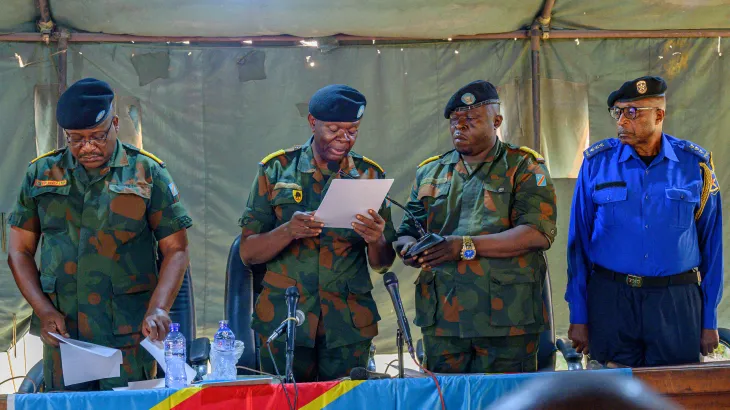A military tribunal in the Democratic Republic of the Congo has sentenced 26 individuals to death for their involvement with armed factions, including the M23, following a prominent trial that began late last month.
The court found the leader of a major armed group guilty of war crimes, rebellion, and treason. Along with this leader, 20 other defendants received death sentences in absentia, as they are currently evading arrest.
The five defendants who were present during the trial have five days to challenge the verdict, according to the court president.
The prosecution, which began on July 24, had sought the death penalty for 25 defendants and a 20-year prison sentence for one individual.
The former head of the electoral commission in the Democratic Republic of the Congo, Nangaa, established the AFC political-military movement in December, aiming to bring together armed factions, political groups, and civil society to challenge the government.
Among the group’s members is the M23 armed faction, which is accused of committing mass killings during the long-standing conflict in eastern DRC. Prominent M23 figures facing trial include its president Bertrand Bisimwa, military leader Sultani Makenga, and spokespersons Willy Ngoma and Lawrence Kanyuka.
From a confidential location, Nangaa conveyed that “this troubling judicial process underscores our commitment to restoring democratic stability in Congo.”
Earlier this year, the Congolese government, defying human rights advocates’ criticism, ended a death penalty moratorium that had been in place since 2003. The move targets military personnel accused of treason. President Felix Tshisekedi, along with experts from the U.S. and the United Nations, has charged neighboring Rwanda with supporting the Tutsi-led M23, which has captured significant areas in eastern DRC since late 2021.
The DRC’s prolonged instability, enduring for over 30 years, results from a combination of intricate and deep-rooted issues along with various actors.
The M23 is one of several rebel groups active in the turbulent eastern region of the DRC, many of which are remnants of a regional conflict that ignited in the 1990s following the fall of long-standing dictator Mobutu Sese Seko.
Tshisekedi has alleged that his predecessor, Joseph Kabila, is involved in planning an “insurrection” and has ties to the AFC.
In a statement from Belgium, where he is receiving medical treatment, Tshisekedi said, “The AFC represents Kabila.”
Kabila transferred leadership to Tshisekedi in 2019 after Tshisekedi, a former rival, was declared the winner of the contentious December 2018 election.
Several individuals from Kabila’s People’s Party for Reconstruction and Democracy (PPRD) have joined the AFC and are now waiting for the verdict in a military court in Kinshasa, where they face the possibility of the death penalty.


